- Home
- Evelyn James
The Valentine Murder Page 7
The Valentine Murder Read online
Page 7
Spinner snatched back the paper and scrawled a list of names and addresses on the back.
“Is that it?”
Clara decided she was done with the man.
“Yes,” she said. “That will do for now.”
“Thank goodness,” Spinner groaned. “This was almost as bad as those police yesterday, asking all sorts of questions and wasting so much of my time.”
“What questions did they ask you?” Tommy enquired, knowing he was testing Spinner’s patience.
“I told you. Did I know Bill was working that day? Did I have a quarrel with him? Did I see him in the field? All sorts of stupid things. They pestered my wife too, throughout her whole day. Good job I wasn’t having to deal with that bullock yesterday, isn’t it? Leave an animal too long in a ditch and it will rot and release all sorts of nasty stuff into the water, which can then seep into the earth and contaminate the rivers or peoples’ wells. Farmer can get into a lot of trouble for that!” Spinner crossed his arms over his chest. “After all this, can I be assured you will prove my innocence?”
Clara had been examining the list he had written out. She was noting the gaps, the portions of time when he could have been killing William Beech. But why would Spinner do such a thing? What was his motive? Still, she was careful what she said to him in response to his question.
“We have taken the first critical step,” Clara told him. “Of course, what would be best for you is if we could find the real killer of Mr Beech. That would clear your name completely.”
Spinner did not notice her sidestepping his question because her statement had intrigued him.
“Give the police a proper suspect, you mean?” He said.
“The real culprit,” Clara replied, emphasizing the word real.
“Someone who had a grudge against Bill?” Spinner persisted. “Like that fellow Hanna has been seeing. She was holding off on marrying him, saying her father needed her. Bet he would have liked old Bill out the way.”
There was a nasty edge to Spinner’s voice that Clara found unsettling. She made a mental note of his suggestion, nonetheless.
“There is one final thing,” Clara said. “I assume when you found Bill you did not notice if his pocket watch was in his waistcoat or jacket pocket?”
Alastair Spinner’s eyebrows descended into that angry glower they were becoming familiar with.
“Why would I? His watch was not important!”
“It’s just that his watch was found yesterday, in Spinner’s Copse. Down a rabbit hole.”
The colour drained from Alastair’s face and his eyes went to the right as if he was looking through the wall of his home, across the fields to the copse where Patch had made his discovery.
“What was it doing there?” He asked.
“We don’t know, but it raises some curious questions. It also suggests that the killer, whoever that was, passed across your land after the murder. You didn’t happen to see anyone about that day who should not have been there, did you?”
Spinner seemed to be still fixated on the copse of trees he could not see. He was breathing shallowly.
“That will go against me,” he mumbled and there seemed to be real terror in his face now, not just belligerence.
“Mr Spinner?” Clara asked.
“I saw no one!” He snapped at her. “Are we done? I am done, anyway. I have animals to look at and a gate to mend and… and you are bothering me now. Go on and do what you have to. Come back when you know who killed Bill. Got it?”
Clara was amazed that she managed to bite her tongue in the face of his insufferable arrogance and rudeness. She rose and Tommy followed. Her one indication of how fed up she was with the man was that she did not bid him farewell as she and her brother marched out of the room. They headed through the kitchen where Mrs Spinner was still ironing, and did not bother to look up, and let themselves out the back door.
It was after midday and the thought of the long trek home was not appealing on an empty stomach. Clara cast her eyes to Tommy.
“Shall we see what food The King’s Arms serves?”
“Are we really taking this case?” Tommy grumbled. “The man is vile.”
“Maybe when we are extremely wealthy, we can pick and choose more, until then, any case is better than none. Come on, let’s get some food.”
She started around the house, noticing that her brother’s gaze had drifted across the fields to Three Pigs Farm.
“Annie has more on her plate than us,” Clara reminded him. “Let her be.”
Tommy sighed. He would never admit how much he was missing Annie, but it was plain to see. Clara linked her arm with his.
“Come on, I need you to give me your opinion on the local bitter,” she cajoled him.
A slight smile returned to Tommy’s lips.
Chapter Nine
The King’s Arms was actually just outside Hove in the ancient parish of Hangleton. Hove was fast becoming an equivalent to Brighton, with its seaside hotels and rows of suburban villas. Hangleton was still clinging to its rural origins as it teetered at the edge of the monster that was becoming the town of Hove. How long it would retain its quaint old-fashioned charm was another matter. The heart of the village was the sixteenth century manor house, a sprawling grey stone building, and the modest medieval church of St Helen’s. It was the sort of quiet, otherworldly place you could imagine coming to for a Sunday afternoon picnic.
Hangleton remained an agricultural area and that was noticeable by the nature of the people milling around the main street. A shepherd was ushering his flock along the lane, whistling to a black and white dog that scuttled back and forth behind the recalcitrant herbivores, nudging then along. Several labourers were sitting on a wall smoking and drinking from earthen jars, deep in intense conversation about something. A cart loaded with straw was just emerging from a side street, its load precariously tilting as the old horse in the shafts pulled it along. Amid this humble buzz of rural industry stood the pub. It was a larger building than Clara had expected and offered rooms for boarding as well as food and drink. Some of the notices in the windows, including one for a guided tour of Hangleton, suggested to Clara that the pub catered regularly to visitors and was thriving on the village’s newfound tourist appeal.
They stepped inside and found a respectable looking bar area, with plenty of tables and chairs and a massive fireplace at each end. A menu was carefully nailed to one wall and described the daily dishes the pub was eager to offer those who were hungry.
“Irish stew,” Tommy read, thoughtfully. “Don’t mind if I do.”
Considering the food potentially on offer at home, should they attempt to cook for themselves again, it was quickly agreed between them to have their dinner at the pub. The approached the bar where an older woman was stacking glasses in a delicately balanced pyramid. She was just reaching the fourth row of glasses and being careful how she placed them.
“Hello,” Tommy said.
The barmaid had been so absorbed in her work she had not heard them approach and startled. There was a terrible moment when it seemed her entire construction would come crashing down. Thankfully, the glasses remained stacked.
“Can I help you?” The barmaid asked, looking a little flushed by the excitement.
“Two portions of Irish Stew,” Tommy said keenly.
The barmaid nodded.
“Visiting for the day?” She asked. “We get a lot of walkers or people interested in history.”
“No, we are here on business,” Clara replied.
The barmaid looked disappointed.
“You see, we have these pamphlets for sale telling you all about the walks available around Hangleton, and another about the church. Just twopence each,” she said, hopeful she could make a sale.
“No, thank you,” Clara turned her down gently. “We are looking for Mr Steadman. Is he about?”
“You might catch him at home,” the barmaid answered. “He lives just a few doors down. I can direct y
ou there if you want?”
“After lunch,” Tommy said firmly.
“After lunch,” Clara agreed.
The barmaid showed them through to a back room that served as a dining area. There was another, smaller fireplace which was burning brightly. Clara took a pace near it and warmed her hands.
“It is bitter out there today,” she observed to the barmaid.
“Have you walked a fair way?” The barmaid asked, setting out cutlery and napkins on a table for them.
“We just came from Spinner’s Farm,” Tommy said nonchalantly. “Terrible business, what happened there the other day.”
“Oh, that was dreadful,” the barmaid winced as she spoke. “But that is not normal around these parts. We have so little crime usually. I can’t think the last time anyone was murdered about here.”
“Just makes you a bit nervous, wandering about,” Tommy added, helping her along.
“You mustn’t be, not at all,” the barmaid insisted. “I am sure the police will have the killer behind bars soon.”
She had finished with the table.
“I take it you have come from seeing Mr Spinner, then?” She asked, a hint of curiosity in her tone.
Clara liked it when people started to bite.
“We have. Mr Spinner is naturally terribly upset about what happened,” she said. “He actually told us to try The King’s Arms when we came into the village to see Mr Steadman. He says he comes here often.”
“He does,” the barmaid nodded keenly. “Why, he was only here the day it happened. With Mr Steadman, as a matter of fact. That was a funny day. There was something in the air. I saw a blackbird drop down dead in the garden that morning. It was an omen.”
The barmaid was going to say more, but a bell rang summoning her back to the bar.
“Sorry,” she told them. “I shall bring your dinners shortly.”
Then she disappeared. Tommy joined Clara by the fire to warm his hands.
“Another one obsessed with omens and superstition,” he remarked.
“I suppose it is natural when you live in a rural place like this,” Clara shrugged. “Everything is steeped in history and seems so ancient. Just look at that church. This is the sort of place were tales of ghosts and witches thrive and grow with each retelling.”
“That is hardly helpful to us,” Tommy snorted.
“Unless what people are saying is true, and William Beech was slain because of witchcraft.”
Tommy gave her an incredulous look.
“I don’t believe in such things,” Clara said sharply. “But I would be a fool to ignore that others might and that it could lead them to commit a terrible crime.”
Talk of a grisly murder was not conducive to the appetite, so they changed the subject for the time being, moving on to discussions of the forthcoming wedding of Tommy and Annie. They had finally settled on a date in June and had booked the church. Clara was still being worked upon to be a bridesmaid, she felt a touch uncomfortable in the role, somehow not sure she was suited for such a duty. Annie was being insistent, however, and when Annie had set her mind to something, it was very unlikely she would not get her way.
“Annie was explaining to me how she intends to go about the wedding cake. I was prepared to put an order in with the baker, but she wants to make it herself,” Tommy continued.
“I had noticed she was starting to stock up on dried fruit,” Clara said. “She does make a fabulous Christmas cake.”
“I don’t want her overwhelming herself,” Tommy responded. “This is her wedding day. She should enjoy it and not be fretting about whether the guests think her cake is perfect or not. But what do I know?”
Tommy knew his place when it came to Annie and her cooking. He was a good taster and the ideal repository for her many marvellous dishes, but to suppose he could actually influence her cooking or persuade her to have an outsider bake food for them was to overstep the mark.
“It shall all be just fine,” Clara assured him, thinking she might have to try and have a word with Annie. It was probably hopeless, but you had to try.
Their food arrived and they ate with gusto, finding the stew both tasty and served in a decent sized portion. There were lots of potatoes and a basket of bread to mop up the juices. They were happily full once they were done and heading back to the bar to pay their bill.
“Was it all right?” The barmaid asked them as they approached.
“Delicious,” Tommy promised. “I wish I had known about this place before. I could eat that stew every day.”
The barmaid took his good-natured flattery with an air of amusement.
“If you want to see Mr Steadman, you need to turn right at the door and head to the first red brick cottage,” she told them, recalling their earlier conversation. “It’s called Hope Place. I should expect him at home this time of day, having his dinner.”
“Thank you,” Clara said. “Tell me, is the only way back to Spinner’s Farm past the place where that terrible thing happened?”
“It is the shortest way,” the barmaid replied. “If you want another route, then you will need to go all through the lanes and probably add half an hour or more to your journey. Not that I don’t understand your concern. Personally, I would never walk past such a spot.”
The barmaid pressed a hand to her throat as she considered the horror of the murder and the stain it had left on the land.
“That place shall never be the same. Not now blood has been spilled,” she hissed softly.
“What does that mean?” Clara asked.
“There shall always be badness there. Evil attracts evil. Poor Mr Spinner is going to have quite a job to get anyone to do the hedges in that field again, after this. No one will dare go near.”
Clara was sure the air had gotten colder around her with this pronouncement. She shook off the reaction. She was not superstitious and, as horrible and terrible as the murder had been, it would not leave a taint on that bit of grass and hedge, other than in the minds of the locals. But then again, maybe that was enough? Maybe it did not require a physical reminder to fix forever that spot as cursed and evil.
“I think the police should have someone guarding the place,” the barmaid persisted, her voice dropped to a whisper.
“Why?” Clara asked.
“Because people with darkness in their hearts will go to a place like that for wickedness,” the barmaid gave a visible shudder.
Clara frowned.
“You mean they will go to look at the site, to gawp?”
“No, I mean that if you were inclined, you would go to that place and dig up a bit of the bloody soil to take away. You can use that in some nasty witchcraft, blood-soaked soil. My grandmother told me all about that. If you want to set the evil eye on someone, then blood from a murder victim is ideal, makes it stronger than just ordinary blood.”
The barmaid said this in as rational a fashion as if she was telling Clara the correct way of darning a sock, yet she was talking about black magic, something that did not exist. Clara had to be careful what she said, she was sure there must be a disbelieving look on her face. She cleared her throat.
“Well, I did not know that,” she said.
“People forget so fast,” the barmaid shook her head sadly. “The old ways are so important. Still, I shall be safe. I have a horseshoe over my bed and a lucky four-leaf clover in the Bible I was given for my confirmation.”
Clara wondered if she should point out the contradiction of a lucky clover in a Bible but decided she had already heard enough about the way people thought in Hangleton.
“Thank you for the stew and the directions,” she said, ending the conversation.
They paid their bill and headed outside where it was raining again.
“Ugh, bring on spring,” Tommy grumbled.
They hurried down the road to the first red-brick cottage they spotted. A wooden board had been burned neatly with a poker to read ‘Hope Place’ and was fastened to the bricks. Clara went to
knock on the door, but as she did it swung open. She was surprised enough to come to a complete halt.
“Maybe it wasn’t properly latched?” Tommy suggested.
Clara wasn’t satisfied with the answer, not after recent events. On another day, when an old man had not been brutally murdered while at work, she might have just thought it a mistake. As Tommy said, the door had perhaps not been latched, but right at that moment she was too alert to potential trouble to be so complacent.
She pushed the door fully open, half expecting to see a body on the floor. The door led directly into a cosy sitting room. A clock was happily ticking on the mantelpiece and a fire was softly flickering in the hearth. There was an aura to the room, as if it had been occupied just a moment before.
“What is that dark patch on the rug?” Tommy whispered over Clara’s shoulder.
There was an old faded carpet before the fire and in the centre of it was a round black stain that looked ominous.
“Hello?” Clara called, but no one replied.
After a moment of consideration – this could be a crime scene, after all, and she did not want to disturb evidence – she took a cautious step into the house. There was nothing obviously out of place, no sign of a struggle, but then William Beech appeared to have been taken by surprise, that was this killer’s way of operating. Perhaps the murderer had come for Steadman too, but why?
Clara moved towards the rug, thinking all sorts of ghastly things about what might have become of the crop seller. She put her hand down and touched the very edge of the stain on the rug.
“Wet,” she told Tommy, “and warm.”
“Good God, more blood!” Tommy hissed, his face going pale. “Where’s the body? It can only have happened moments ago!”
Clara lifted up her fingers and smelt them.
“More like coffee,” she said.
“What?” Tommy asked.
In that instant, there were footsteps from somewhere deeper in the cottage. They drew closer to a doorway leading into the front room and suddenly a burly man in a waistcoat appeared before them. He came to an abrupt halt at the sight of Tommy and Clara, the latter bent down over a stain on his rug. He gave them both amazed looks before demanding:

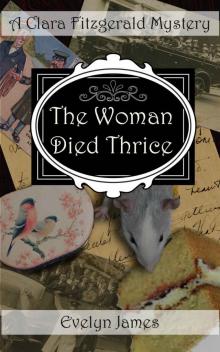 The Woman Died Thrice
The Woman Died Thrice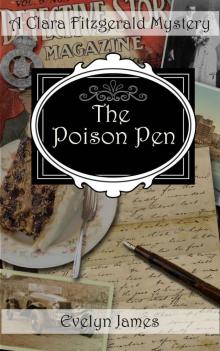 The Poison Pen
The Poison Pen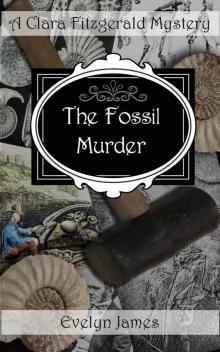 The Fossil Murder
The Fossil Murder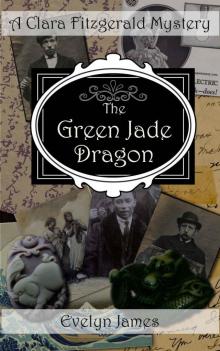 The Green Jade Dragon
The Green Jade Dragon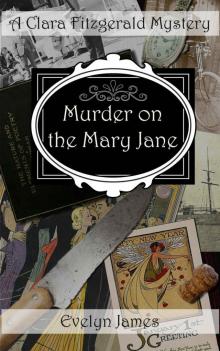 Murder on the Mary Jane
Murder on the Mary Jane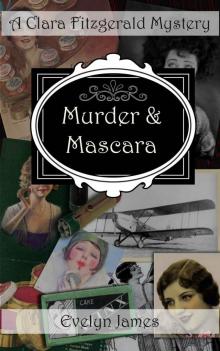 Murder and Mascara
Murder and Mascara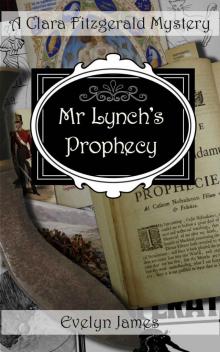 Mr Lynch's Prophecy
Mr Lynch's Prophecy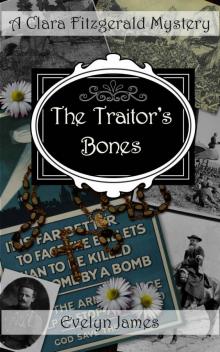 The Traitor's Bones
The Traitor's Bones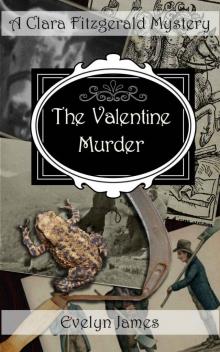 The Valentine Murder
The Valentine Murder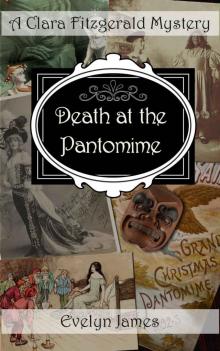 Death at the Pantomime
Death at the Pantomime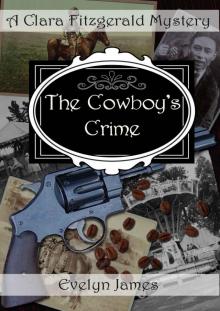 The Cowboy's Crime
The Cowboy's Crime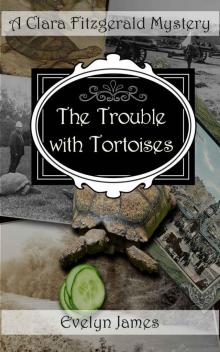 The Trouble With Tortoises
The Trouble With Tortoises The Monster at the Window
The Monster at the Window